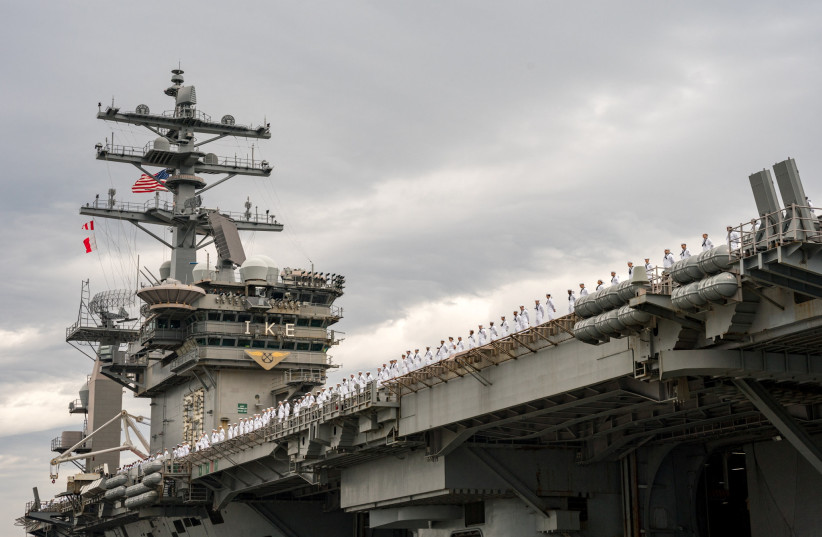The United States increased its military forces in the Middle East as it braced for increased Iranian proxy attacks against American targets as Prime Minister Benjamin Netanyahu worked to avoid a two-front war with Tehran-backed terror groups.
“We are concerned at the possibility of Iranian proxies escalating their attacks against our own personnel, our own people,” Blinken told CBS on Sunday. “We’re taking every measure to make sure that we can defend them and, if necessary, respond decisively.
US Senator Lindsey Graham warned Iran “that if this war grows, it's coming to your backyard,” during a Tel Aviv press conference.
US Defense Secretary Lloyd Austin said late Saturday that Washington would send more military assets to the Middle East both in support of Israel and to strengthen the U.S. defense posture in the region.

2 Carrier Strike Groups and 2,000 troops
“I redirected the movement of the USS Dwight D. Eisenhower Carrier Strike Group to the Central Command area of responsibility,” Austin said.
“This carrier strike group is in addition to the USS Gerald R. Ford Carrier Strike Group, which is currently operating in the Eastern Mediterranean Sea,” he added.
A Terminal High Altitude Area Defense (THAAD) system and extra Patriot air defense missile system battalions will be sent to the region and more troops put on standby, he said. There are already some 2,000 US troops ready to be deployed.
These steps, Austin told ABC, “sends another message to those who seek to widen this conflict.”
He spoke on the 16th day of the Gaza War, which began on October 7th, when Hamas infiltrated Israel’s southern border killing over 1,400 civilians and soldiers and taking another 212 people hostage. Over 4,500 people have been killed in Gaza either due to IDF aerial strikes or failed Palestinian rocket launches.
Israel has prepared to follow those bombings with a ground campaign to oust Hamas, which has forcibly controlled the 2.3 million people in Gaza since it violently seized control of the enclave in 2007.
It has received wide support for that action from the United States, as international diplomatic activity focused on freeing the hostages and preventing Hezbollah from attacking Israel.
Blinken told NBC on Sunday that “we’ve sent a very strong message to try to deter Hizballah, deter Iran more directly, from opening up a second front.”
Netanyahu on Sunday visited the IDF Commando Brigade in the north and was briefed by military commanders about IDF actions in all spheres including the West Bank.
“At the moment, I cannot tell you if Hezbollah will decide to fully enter the war or not,” Netanyahu said, as military exchanges with the proxy group based in Lebanon increased and Israeli communities in that region were evacuated.
“If Hezbollah decides to enter the war, it will wish for the Second Lebanon War; it will be making the mistake of its life.
“We will strike it with a force that it cannot even imagine, that will be destructive for it and for the Lebanese state,” Netanyahu said..
“We are now in a double battle. One battle is to block them [the enemy] here” in the north. The second battle [in the south] is to win a crushing victory that will erase Hamas,” Netanyahu said.
He underscored the existential nature of the war, particularly in the South. “We are fighting for our lives, for our home. This is no exaggeration – this is war,” Netanyahu stated.
He also held a series of phone calls with Western heads of state such as US President Joe Biden, Spanish Prime Minister Pedro Sánchez, French President Emmanuel Macron, and Dutch Prime Minister Mark Rutte who is expected to visit Israel on Monday and Tuesday. Macron is also expected to arrive on Tuesday.
On Saturday night Netanyahu hosted Italian Prime Minister Giorgia Meloni and Cypriot President Nikos Christodoulides.
Iranian security officials told Reuters Iran's strategy was for Middle East proxies like Hezbollah to pursue limited strikes on Israeli and U.S. targets but to avoid a major escalation that would draw in Tehran, a high-wire act for the Islamic Republic.
Palestinian Prime Minister Mohammad Shtayyeh called on the international community to create "a united front" to stop Israel's attacks against Gaza and allow in desperately needed aid which has only begun to trickle in.
"We place at the top of our priorities stopping the Israeli aggression (...) and bringing in medical and relief aid to prevent a major humanitarian catastrophe," Shtayyeh said during a meeting with 25 ambassadors, representatives, and consuls.
US politicians in Israel as well as Austin and Blinken in the United States all said they stood firmly behind Israel’s goal to oust Hamas from Gaza, with Austin comparing that battle with the one he led against ISIS in Mosul.
Austin said he believed that an IDF ground campaign in Gaza would be difficult because of Hamas’ underground network of tunnels. Hamas “has had a long time to prepare for a fight,” he said as he predicted that it would include IEDs and bobby traps.
At this point, he said, he was speaking almost daily with Defense Minister Yoav Gallant, adding that during those calls he also spoke of the importance of protecting Palestinian civilians during the battle.
Blinken told NBC that the war began because Hamas had slaughtered innocent Israeli civilians and that no country could tolerate such an attack.
Hamas, he said, can no longer be allowed to govern Gaza but he stressed that Israel has “absolutely no intent, no desire, to be running Gaza themselves.”
Reuters contributed to this report.
